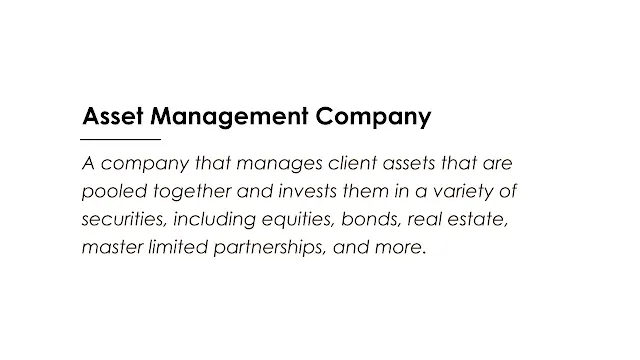 |
| Image: Moneybestpal.com |
Asset Management Company (AMC) is a company that manages client assets that are pooled together and invests them in a variety of securities, including equities, bonds, real estate, master limited partnerships, and more. AMCs offer individual investors greater levels of diversity, liquidity, and expert management consulting services than are typically offered. Money managers or money management companies are other names for AMCs.
The asset management sector has recovered well from the global pandemic, with assets expanding by 11% in 2020 to reach $103 trillion at year's end. Retail portfolios, which made up 41% of global assets at $42 trillion in 2020, increased by 11%, while institutional investments, which made up 59% of the market at $61 trillion, also increased at a comparable rate.
Assets under management (AUM), which increased by 12% to reach $49 trillion in 2020, continued to expand by double digits in North America, the largest asset management market in the world. Additionally, the Middle East and Africa (12%), Asia-Pacific (11%), and Europe (10%) also experienced robust growth. Nonetheless, overall profitability was basically unchanged from 2019 due to costs and fee compression, which kept operating profits at a constant 34% of net revenues.
Asset managers are entering a new period that will challenge them to adapt to new business practices as the effects of the global crisis fade. On the operations side, remote work and customer service models have become mainstays. Businesses must embrace cutting-edge data and analytics for every operation if they want to stay competitive. New asset classes, particularly those found in private markets and alternatives in general, will be essential to growth on the revenue side over the next years.
Financial assets and securities that are not publicly traded or listed on a stock exchange are sold in private markets, which are divisions of the capital market. They include hedge funds, real estate, infrastructure, private loans, and private equity. Private markets give investors access to greater returns, reduced volatility, benefits of diversification, and exposure to cutting-edge industries and business models.
According to the BCG report, private markets accounted for $7.4 trillion of AuM in 2020, up from $6.5 trillion in 2019. With $3.9 trillion in AuM, private equity was the largest sector, followed by real estate ($1.7 trillion), private debt ($848 billion), infrastructure ($582 billion), and natural resources ($393 billion), and hedge funds ($3.2 trillion) (including both private and public market strategies).
Low-interest rates, high valuations in the public markets, increased demand from institutional and retail investors for alternative sources of income and capital appreciation, and the emergence of new industries and opportunities like technology, health care, sustainability, and impact investing have all contributed to the expansion of private markets.
Private markets, however, often provide major difficulties for both investors and asset managers. Longer investment horizons and lock-up periods, higher fees and costs, regulatory uncertainty and scrutiny, operational inefficiency and fragmentation, talent scarcity and retention issues, decreased liquidity and transparency, higher complexity and risk, and increased competition and consolidation are a few of these.
- Establishing a wide network of connections with possible deal sources such as business owners, middlemen, consultants, and co-investors. Asset managers may be able to access excellent opportunities, gather knowledge about market dynamics and trends, and bargain for better terms.
- Creating a clear investment thesis and criteria that are in line with their client's tastes and goals. This can assist asset managers in communicating their value offers to prospective partners and targets as well as focusing on the most lucrative segments and industries.
- Utilizing analytics and data to improve portfolio management and decision-making. Asset managers can use this to evaluate prospects, execute due diligence, keep an eye on performance, and plan for exits. Asset managers may demonstrate their influence and value generation to their customers and stakeholders with the aid of data and analytics.
- Adopting a flexible and agile strategy for portfolio management and deal execution. This can assist asset managers in reducing risks, taking advantage of new possibilities, and adapting to changing market conditions. The ability to work cooperatively with other investors, co-investors, or business partners is another skill that asset managers should have.
- Investing in the retention and development of employees. Asset managers must find, nurture, and keep top performers with the knowledge, practical experience, and outlook necessary to function in the private markets. A culture of quality, creativity, and collaboration should be promoted by asset managers in order to support their vision and strategy.
- Innovating in environmental, social, and governance (ESG) investing: Since investors demand more and more that their money be used in sustainable and responsible ways, ESG investment is emerging as a mainstream trend in the private markets. By incorporating ESG factors into their investment processes, reporting, and disclosures as well as by providing products that are in line with particular ESG themes and objectives, such as climate change, social impact, diversity, and inclusion, asset managers can set themselves apart from their competition.
- Using digital platforms and collaborations can help asset managers attract new clients, expand their distribution networks, increase the effectiveness of their operations, and gain access to fresh sources of information and insights. Asset managers can work together with other participants in the private markets ecosystem, such as intermediaries, service providers, regulators, etc., by utilizing digital platforms and partnerships to streamline workflows and processes, offer personalized advice and solutions, and create seamless customer experiences.
